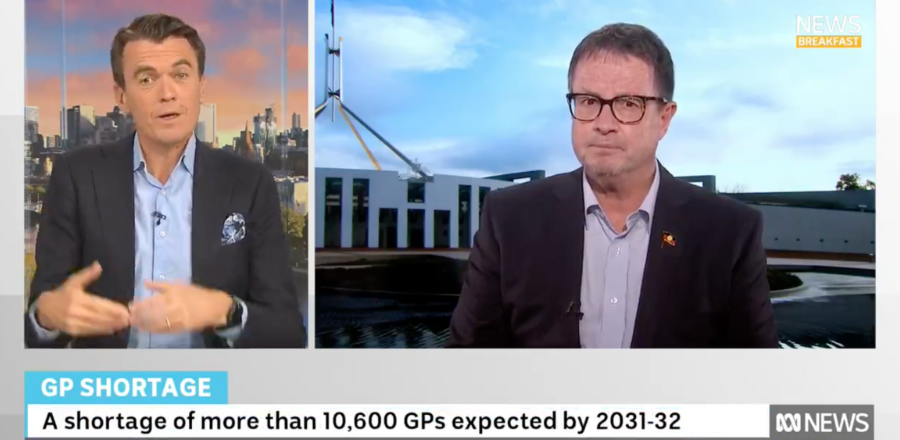Professor Steve Robson on the projected shortfall of over 10,600 GPs
Transcript: AMA President, Professor Steve Robson on ABC News Breakfast, Friday, 25 November 2022
Subject: AMA’s new report, The General Practice workforce – why the neglect must end.

HOST: MICHAEL ROWLAND: Back home now, the Australian Medical Association is warning the country is facing a shortage of more than 10,000 family doctors in the next decade as demand grows and more overworked GPs simply quit. AMA President Steve Robson joins us now from Canberra. Steve, good morning to you. That's a lot of doctors and a lot of shortages.
STEVE ROBSON: Yeah, good morning, Michael. I agree with you. It's a major problem that we're looking at, that at the end of the decade we could be 10,000 GPs short, and action needs to be taken now.
MICHAEL ROWLAND: What sort of action are you calling for?
STEVE ROBSON: Well, we need to make general practice an attractive career for new medical graduates. It used to be that a half of all freshly graduated doctors aspired to become a general practitioner. But the way things are looking now, probably about one in seven, which is going to leave us with a tremendous shortfall. And we all understand just how difficult it is to get an appointment to see a GP as it is now.
MICHAEL ROWLAND: What can governments, I guess all levels we're talking about, do in a practical sense to make two things possible? One, more medical graduates become GPs; and secondly, more importantly, encourage them to go to rural and remote Australia?
STEVE ROBSON: Look, I agree with you there that it is a major problem for Australians who live outside of our capital cities. So the government's got to first of all understand that there is a crisis, and we're hearing some positive things from the Federal Health Minister Mark Butler at the moment. But we've got to make it an attractive career pathway, and I think over the last few years we've seen the profession of general practice become less attractive to young graduates. It doesn't earn them as much money as it would if they stayed, for example, in hospitals. And often there's just a perception we're seeing from some areas of the government that it's a profession that's not as valued, and we want to see that value brought back into it, it valued and really be the preferred destination for our clever young doctors.
MICHAEL ROWLAND: Okay, so financially are there ways to make a career as a GP, a family doctor more attractive to graduates?
STEVE ROBSON: I think one of the key things is if you're training to be a GP, you do it out in general practice, and you lose a lot of the things like maternity leave that you can keep when you're working in a hospital setting. So there's some simple things like just making sure that the conditions for people who are training to become general practitioners are on parity with their colleagues who're working in our big public hospitals.
We also have to get past the Medicare freeze that in real terms dropped the rebates that patients get and bulk billing rates for so many years - for a decade. We've got to move forward and just make it a viable career option that young, clever people want to do.
MICHAEL ROWLAND: I know, and we've talked about this on the show quite a bit as you know, Steve, GPs are incredibly overworked. My local GP, Tamsin, is a wonder. She has done amazing things during the pandemic.
STEVE ROBSON: Yes.
MICHAEL ROWLAND: You know, fully suited at the height of the pandemic, administering vaccines and dealing with COVID patients. She's still going but lots of people- GPs are leaving, as you say. I'm interested to know if GPs leave, especially mid-career GPs, generally what happens to them? Where do they tend to go?
STEVE ROBSON: I think there are a number of options that people go into. We're seeing some people returning to hospital practice. We're seeing some people just go into other roles like administration or health advocacy, all sorts of things. And some are just retiring, some are becoming grey nomads and all sorts of things. So we need- you're absolutely correct, Michael, that we need to get the hard-working GPs who are considering a career change to stay where they are and keep providing the care that we all need and providing incentives to do that.
MICHAEL ROWLAND: Steve Robinson, AMA President, appreciate your time. Thank you so much for joining us on this very important issue.
STEVE ROBSON: It's a real pleasure, Michael. Thank you.
TONY ARMSTRONG: So my GP, Dr Cal Lawford, he's incredible. And the work he did over the pandemic was- it was at great personal toll.
MICHAEL ROWLAND: A personal toll, because let's not forget that the GPs, every GP would have had to have the full PPE gear, which is awkward when you're trying to deal with patients. And no matter the strongest protection you've got as a GP, if you're dealing with COVID patient after COVID patient after COVID patient, you're putting yourself at immense risk.
TONY ARMSTRONG: Huge risk. And Cal has a young family, so the stress that that put on them was enormous. So, yeah, absolute hats off to everyone in that field.
MICHAEL ROWLAND: Yeah, here's to all the GPs watching. We love you all. Keep up the great work.
TONY ARMSTRONG: Yeah, we really do.


